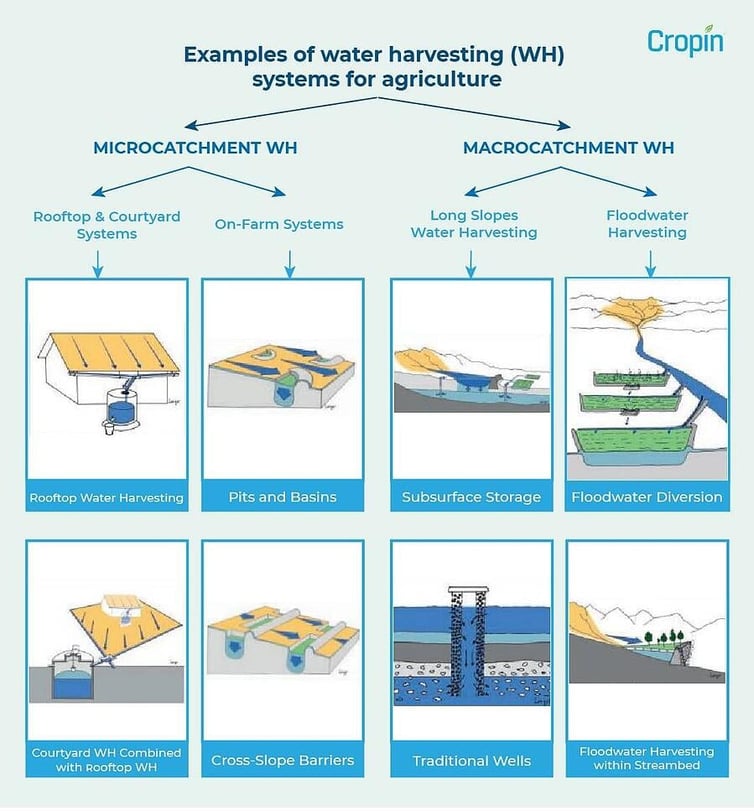Water conservation in agriculture is a critical issue that affects not only the sustainability of food production but also the well-being of our planet. Agriculture accounts for 70% of the world's freshwater consumption, and as our population continues to grow, the demand for food will only increase, putting even more pressure on our limited water resources. Freshwater supply is limited — just 2.5% to put it in figures, and most of it is used up for agricultural activities. Groundwater depletion is a threat to global food security. Also, the outflow is much faster than the inflow; around 245 billion cubic meters of groundwater is consumed in India annually, and 90% goes to agriculture. The picture is way bleaker than it appears to the naked eye, and the government realizes it. Consumption is on the soil; with that, there will be more stress on agricultural land and freshwater. Hence, backed by technology in agriculture, farmers are now implementing advanced processes to conserve water, thereby making sustainable agriculture possible soon.
With innovative and sustainable practices, we can conserve water in agriculture and ensure a bright future for both food production and the environment. For instance, precision agriculture that uses sensors and smart technology can help farmers optimize water use, reducing waste and increasing efficiency.
Another effective approach to water conservation in agriculture is the adoption of drought-resistant crops and the use of organic fertilizers and mulch, which help to reduce evaporation and retain moisture in the soil. In regions with limited water resources, farmers can also utilize rainwater harvesting and storage techniques to capture and store rainwater for use during dry spells.
But water conservation in agriculture is not just about preserving resources for food production. It also has a far-reaching impact on the environment and human well-being. For example, conserving water in agriculture can help to reduce the stress on water systems, maintain healthy ecosystems, and preserve aquatic life.
Before discussing the ways farmers are conserving water to promote agricultural sustainability, let us get acquainted with the existing issues first.
Painting a Dire Picture
When it comes to agriculture, smallholder farmers suffer the most. Continued reliance on seasonal cycles has already ruined several harvests. With global climate change, calamities like floods and droughts are becoming more intense with every season. In fact, almost a third of all disaster losses are related to agricultural sectors. Some states like Andhra Pradesh, Orissa, Maharashtra, Rajasthan, and many more remain at the receiving end every year.
This also hampers the overall economy of the agricultural sector. Farmers end up with around 20%-30% revenue losses each harvest. To improve this situation, the government made efforts to come up with irrigation canals. However, several glaring drawbacks are looming around here as well.
Access to adequate water supply and know-how, like the use of technology in agriculture for effective water conservation, is still difficult for the majority of the farmers. Consequently, the harvest suffers immensely, and so does the GDP.
And given the diversity of India, one unified plan does not solve the purpose.
That said, in the words of Zig Ziglar,
‘One small positive thought can change your whole day.’
And thankfully, a lot is happening in terms of positive activities to fuel sustainable agriculture and the use of technology in agriculture for water conservation.
With the infusion of several means of water conservation, farmers are now successfully executing better crop cycles.

5 Water Conservation Methods that promote Sustainable Agriculture
1. Rainwater Harvesting
With this simple yet effective technique, farmers can store excess rainwater for further usage. Hence, farmers can not only ensure water adequacy throughout the yield but also effectively recharge groundwater levels to deal with rapid depletion.
The method is practiced in drought-prone regions of the country where rainfall is aplenty to aid groundwater recharge.
A few states like Rajasthan, Kerala, Tamil Nadu, and several others have benefited from this method, and many more states are adopting this water conservation technique on a large scale.

Source: FAO
2. Irrigation Scheduling
The use of technology in agriculture has been highly potent and fruitful when it comes to water conservation. AgTech leaders, like Cropin, have come up with practical solutions to prevent excess water usage. For example, one can schedule irrigation plans based on the local weather conditions and forecasts for the week.
With the availability of accurate weather predictions, SmartFarm can trigger alerts to farmers to prepare them for unexpected or delayed rainfall. Based on these alerts, they can schedule irrigation at the right time and prevent excessive irrigation, too, thus saving the already low groundwater level.
3. Region-based Produce
Advancements in seed technologies have resulted in resilient crop varieties that produce high yields despite tough growing conditions. In addition, crop advisories that are tailored for crop variety and the agro-climatic zone further enhance agricultural productivity.
Cropin’s farm management software allows farming companies to configure advisories and a package of best practices based on recommendations from agronomists. These advisories and reminders for scheduled farm activities can be shared with extension agents as alerts and notifications, who can pass them on to the farmers they are working with.
This method has turned out to be highly fruitful in drought-prone regions like Rajasthan, where, with drought-tolerant crops, there has been a significant boost in yield. The alerts sent to the field officers via the SmartFarm application enable the farmers to take necessary precautions to avoid damage to the produce. This digital intervention increased the use of technology in agriculture in the region, along with taking a step towards increased revenue for the farmers.
4. Organic Farming
Organic farming improves yield besides reducing the use of fertilizers. According to a Rodale Institute survey, organically-grown corn produced 31% more output during droughts than conventionally-produced corn.
Additionally, this method helps recycle water and reduces the chances of chemical fertilizers polluting the groundwater. The same Rodale Institute survey found that organic fields can charge groundwater levels by up to 20%!
Processes like eutrophication are also on the decline with the increased adoption of organic farming and reduced dependence on chemical fertilizers. This also helps preserve freshwater ecosystems, thereby making agricultural development sustainable.
5. Use of AgTech Solutions
In recent times, the use of agricultural technology to aid sustainable development has become prevalent. With the adoption of precision agriculture and the introduction of products like Cropin Grow (SmartFarm), farmers and organizations get alerts of a possible agri-adversity in advance and have been able to conserve water better and boosted produce significantly. Monitoring all farming practices, from pre-sowing to harvest, with the farm management software also promotes better water management.

At Cropin, we build solutions that analyze pixel-level data derived from satellite imagery, IoT, and field intelligence and deliver actionable insights that boost resource efficiency and crop productivity.
Several brands have partnered with Cropin to realize their targets for sustainable agriculture. With such small but incredibly crucial steps, several lives have already been impacted for the better.
Learn how Cropin’s farm management software can help your agribusiness improve resource efficiency.






